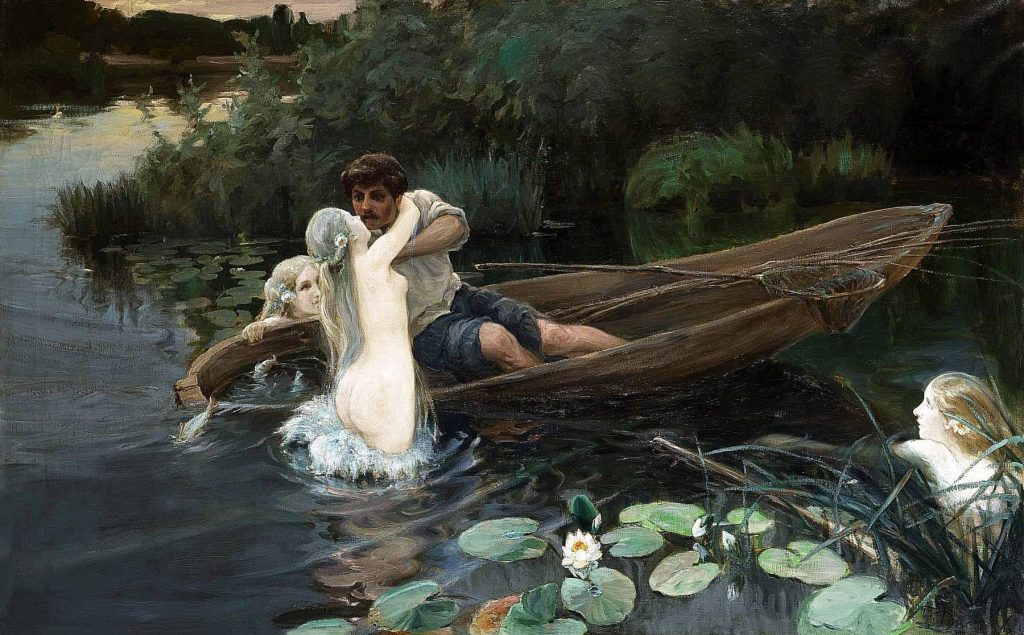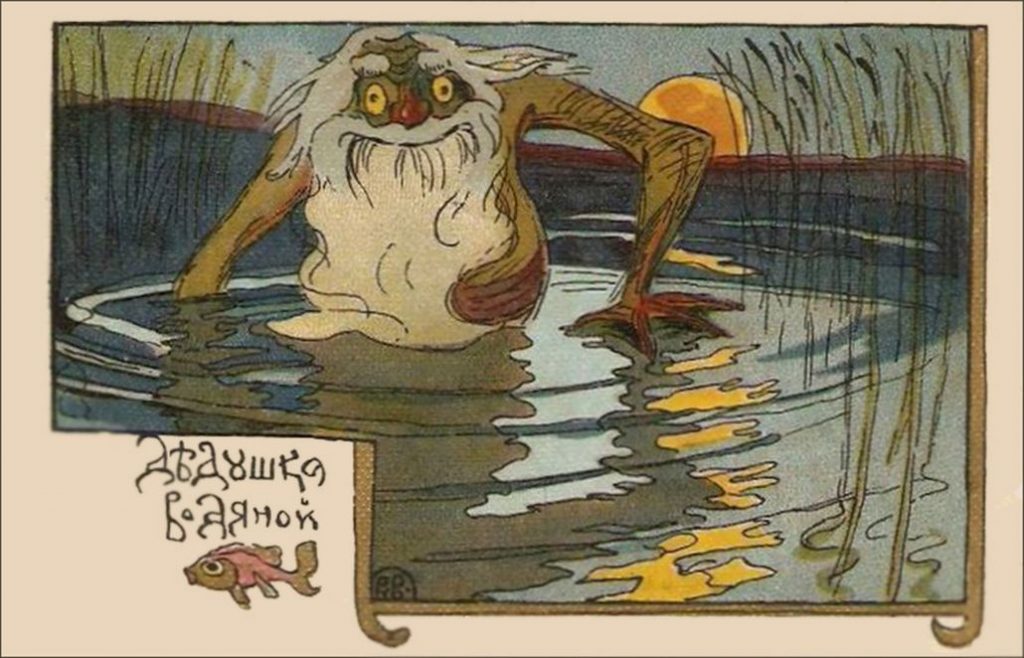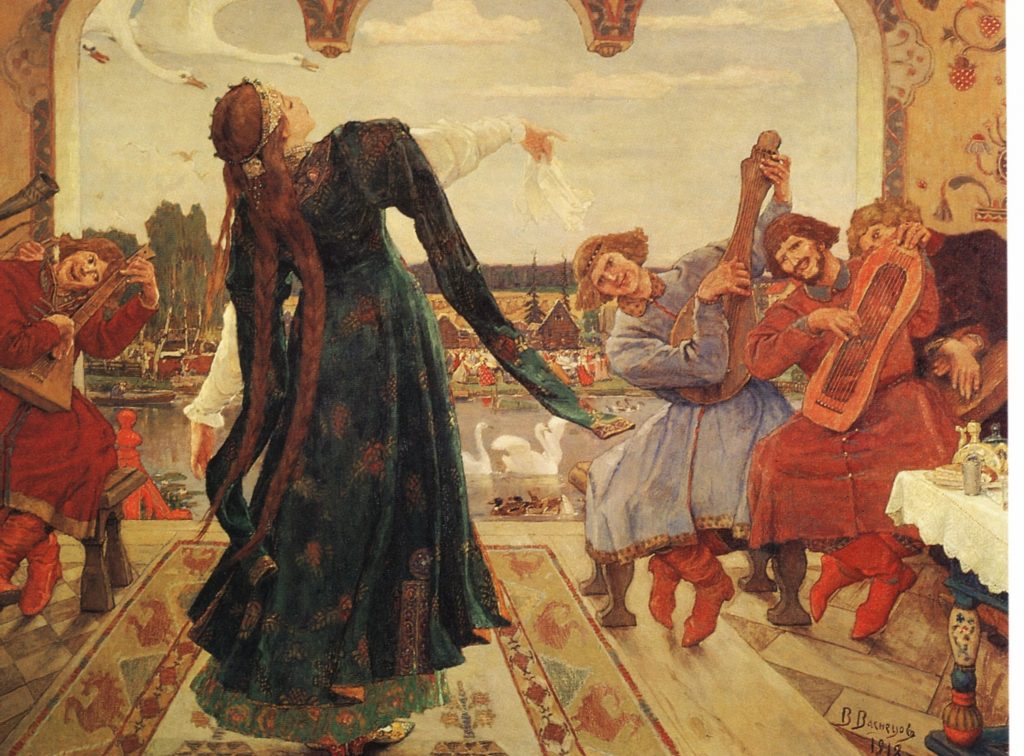Russian Spooky Folk Characters Posted by Maria on Oct 31, 2019 in Culture
It’s Halloween again! This holiday is not as ingrained in Russian culture as it is in some Anglophone cultures—children don’t usually go trick-or-treating, and you won’t see many eerie decorations in people’s front yards (especially since most people live in high-rises). However, children usually learn about it in their English classes, and there may be theme or costume parties. Even though Halloween is not very visible in Russian culture, there are plenty of creepy folklore characters that I’d like to talk about. Perhaps they can be an inspiration for your costume this year?
Руса́лка
Русалка is a Slavic folklore creature somewhat similar to a mermaid. Originally, this was just a folk deity associated with nature. It gradually evolved to be a young woman who either killed herself or was killed by drowning and now tried to lure young men into the water. Russian русалки are not usually depicted with a fish tail (ры́бий хвост)—they are normally either naked or wearing torn clothes.
Кики́мора
Кикимора is another female creature associated with нечи́стая си́ла (evil spirits). She is a house spirit that hides during the day but comes out at night to do mischief or do some chores around the house, such as spinning thread. It was believed that kikimora meant trouble for the household once she moved in and was hard to get rid of. She was also blamed for making various noises around the house, such as banging on walls or groaning.
Водяно́й
Водяной is a water spirit that lives in swamps, near whirlpools, or in water mills. This word is related to water, вода́. He is usually depicted as an old man with a long beard. Just like rusalkas, he is responsible for people drowning.
О́боротень
Оборотень is the Slavic take on a shapeshifter or werewolf. However, оборотень is a person who can turn not only into a wolf but also into other animals and even inanimate objects. This word is related to обрати́ться or, more commonly, преврати́ться в кого-то, to turn into someone.
Now that we’ve seen some popular characters, let’s take a look at this excerpt from “По следам поверженных идолов” (“Following the Smitten Idols”) by Vladimir Epifantsev (Владимир Епифанцев). Because the creatures were discussed don’t always have an exact equivalent in English, I will be using their Russian names in the translation.Небольши́е, окру́глые по фо́рме озёра счита́лись ме́стом обита́ния водяны́х и руса́лок. Водяны́е часте́нько ута́скивали на дно скоти́ну и бра́ли в жён уто́пленниц. По э́той причи́не водяны́е ме́льницы представля́ли осо́бый страх для населе́ния и пе́ред постро́йкой в зе́млю за́живо зака́пывался чёрный пету́х. Опа́сность для пу́тников представля́ли руса́лки, кото́рые свои́м пе́нием заставля́ли сби́ться с доро́ги. У по́йманного руса́лками челове́ка была́ незави́дная судьба́ ― ли́бо быть уто́пленным, ли́бо умере́ть от щеко́тки. Ме́лким «хулига́нством» занима́лись кики́моры, пу́тавшие пря́жу и ворова́вшие шерсть с ове́ц. Кики́моры могли́ прони́кнуть и в куря́тник, и тогда́ пти́цы перестава́ли нести́ я́йца.
Small, round lakes were thought to be vodyanoy and rusalka habitats. Vodyanoys often pulled livestock to the bottom and married drowned women. That’s why water mills were particularly feared, and before one was built, a black rooster had to be buried alive. Rusalkas also were dangerous for travelers because their singing led the travelers astray. A pitiful fate awaited any person caught by the rusalkas—they either drowned or died from being tickled. Kikimoras also caused mischief by tangling yarn and stealing sheep’s wool. Kikimoras could get into the chicken coop, and then the hens would stop laying eggs.
There are other mythical creatures like домово́й (similar to a house elf), л́еший (wood spirit, from лес, forest), or упы́рь (similar to a vampire). Are you familiar with any of these? Are there similar characters in your culture?

Build vocabulary, practice pronunciation, and more with Transparent Language Online. Available anytime, anywhere, on any device.







Comments:
Joao:
Thank you so much. I am been learning Russian for quite sometime now and I find your information a strong help. Thank you again
Maria:
@Joao Thank you for reading!